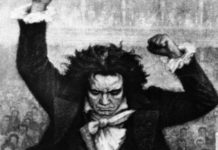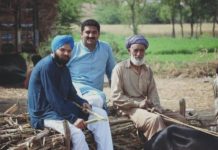
A young man was reciting ‘Naʽat’ (poetry in praise of the Islamic Prophet) at the court of Sayed Muhammad Bakhsh ‘Lasoori Shah’, a Sufi saint from Faisalabad in the 1960s. This was not unusual but no one could imagine that this boy from Punjab would become the King of ‘Qawwali’ in the world of music.
He belonged to the family of musicians. Many youngsters like him were taught the syllabus of music and melody, from their childhood, whether they like it or not.
But this young boy was so skilled and the maturity of his voice was so refined that his listeners were lost in his fascination. Nusrat Fateh Ali Khan was the name of this teen-ager from the Patiala family who migrated from Jalandhar, India after the partition.
This was a time when no one knew Nusrat. Yes, everyone knew that he was the son of the famous ‘Qawwal’ Ustad Fateh Ali Khan of that time. Nusrat had been obsessed with music since childhood and at just ten years old, he had mastered playing “Tabla” (musical instrument each drum is made of hollowed out wood, clay or metal).
After the death of his father Ustad Fateh Ali Khan in the early 1960s, he began to receive regular training in Qawwali from his uncles Ustad Mubarak Ali Khan and Ustad Salamat Ali Khan. When Ustad Mubarak Ali Khan died in 1970, Nusrat Fateh Ali khan took charge as the head of his family of musicians.
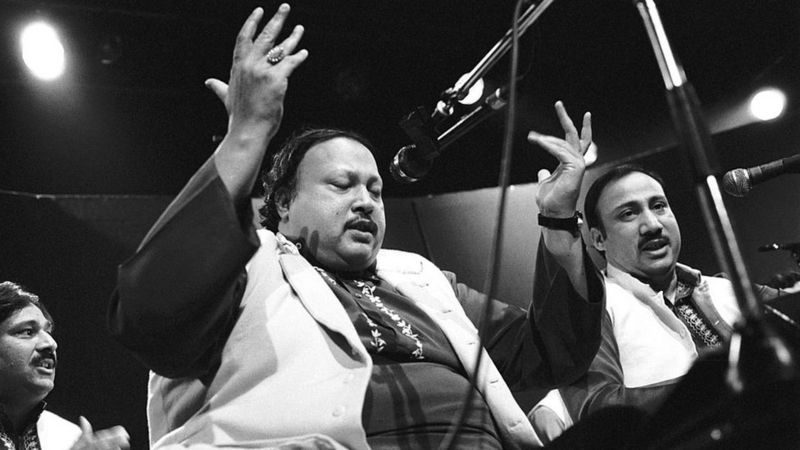
Starting his musical journey from a gramophone studio in the famous Jhang Bazaar of Faisalabad, Nusrat’s talent was first spotted by a jeweler named Mian Rehmat who was the owner of a gramophone record shop in Faisalabad since the establishment of Pakistan. Nusrat’s father had friendly relations with Mian Rehmat.
Mian Asad, the son of Mian Rehmat, the owner of Rehmat Gramophone Recording Studio, says of Nusrat that he has numerous memories of Ustad Nusrat Fateh Ali Khan that he cherishes till date.

He says his father Mian Rehmat has known Nusrat’s family since the 1960s. “My father first met Fateh Ali Khan, Nusrat’s father, who was a famous ‘Qawwal’ of Faisalabad at that time.”
“My father’s acquaintance with Nusrat dates back to early fifties, but in the 1970s, when Nusrat officially took over the charge of his Qawwal family after the death of his uncle Ustad Mubarak, my father began to notice the inner artist in him.
According to Mian Asad, Ustad Nusrat had learnt to play ‘Tabla’ with great skill before he mastered the art of reciting ‘Qawwali’.
Referring to an incident he heard from his father, Mian Asad says, “When Nusrat was ten or eleven years old, mehfil-e samāʿ, a “gathering for spiritual listening.” was organized by his father where various singers were lined up to perform. However, there was no one who could play ‘Tabla’. He asked Nusrat to come and showcase his craft. He accepted the invitation and played with such zeal that the singers got tired but Nusrat carried on playing while listeners were awestruck.
Nusrat taught selection and recitation of poetry
Mian Asad says that since his school days, a series of meetings with Nusrat had started at Rehmat Gramophone Recording Studio or at home. However, “my formal professional relationship with Nusrat began in 1992 when I started working with my father in his business.”
He says, “I used to listen to his stories and conversations with my father. We used to have casual meetings, sometimes at the shop or at our house.”

According to Mian Asad, his father, Mian Rehmat, brought Nusrat to his recording studio in the late 1970s and early 1980s, from where he began recording his ‘qawwalis’ and ‘ghazals’ and then reached the heights of fame.
Mian Asad explains that one of the first few hits of Nusrat were recorded in Rehmat Gramophone studio that included ‘Yaadan Vichre Sajan Diyan’ and the other was ‘Ali Maula Ali Maula’ which became very popular all over the world. Hundreds more were recorded, he says.
“A series of his numerous recordings began and he kept coming to our studio for recordings.” According to Mian Asad, Rehmat Gramophone Company recorded more than 100 Nusrat music albums and released them in the market. These include the poetic scripts of Sufi saint Baba Bulleh Shah, ‘Ki Jana Main Kon’ and many others.
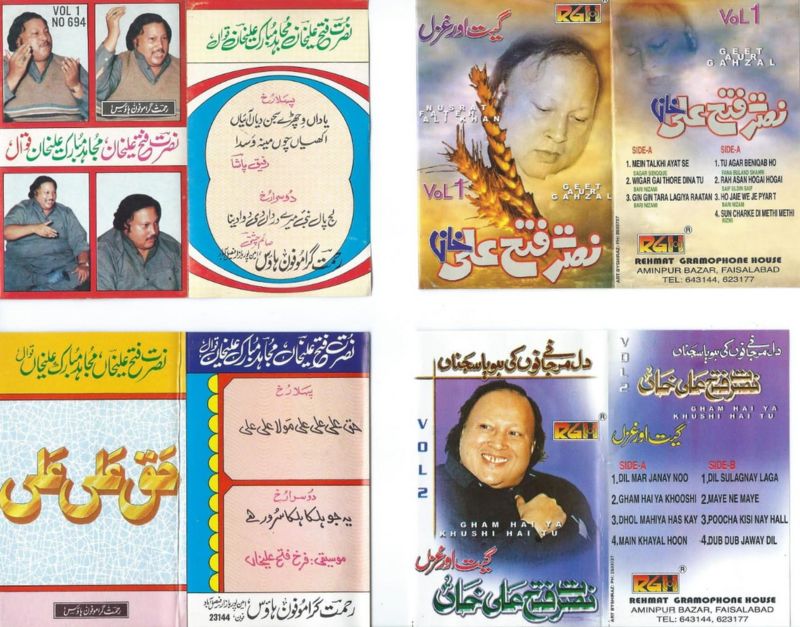
Mian Asad say, if he keeps recalling the relationship Ustad Nusrat Fateh Ali Khan and his gramophone company shared there would be endless tales of love, compassion and his legend.
Another companion of Ustad Nusrat is Ilyas Hussain who has been serving as a chorus of hand-clapping qawwals who sing the refrains; a harmonium (a small, hand-pumped, portable organ) player, who supports the fixed melody as well as the melodic improvisations of the soloist) in Nusrat’s Qawali party since his youth.
“Our family has been serving Fateh Ali Khan’s family for many generations,” said Ilyas Hussain, 58, recalling his memories. I have known Nusrat Fateh Ali Khan since 1975, when I was a child going to school and going to work at his father’s house. I was his student, from 1983 to his death in 1997.
“My grandfather and father were also students of his family. We loved this family,” he said.
“When I started going there at the age of ten, I was soon told by Ustad Farrukh Fateh Ali Khan, the father of Rahat Fateh Ali Khan, that I should learn to do prompt work,” he says. Gradually Ustad Nusrat and Farrukh Fateh Ali Khan started teaching me this.
He later says, “I was taught by Ustad Nusrat Fateh Ali Khan about the selection and recitation of poetic verses.”
Solo for the first time: ‘Let’s record a solo today’

Mian Asad narrates the story of the first solo recording of Nusrat Fateh Ali Khan as follows: When the Qawwal party did not arrive on time, my father said to Nusrat in Punjabi, “Let’s record a solo today.”
Nusrat Fateh Ali Khan was nervous at first but then at the insistence of my father he agreed and immediately a Ghazal was written by a poet present in the studio and he started recording solo for the first time. Mian Asad says, “The most popular of his early solo recordings was ‘Sun Charkhe Di Mithi Mithi kook’.” When this Ghazal was released, and became an instant hit, his Qawwal party got upset because they thought that Khan Sahib may not need them now.
Nusrat’s special sofa in the studio
Mian Asad, the owner of Rehmat Gramophone, recalls that Nusrat had a deep and friendly relationship with his father, as he was always eager to discuss various things and often came to the shop.
“Due to his obese physique, it was uncomfortable for him to sit for a long time, so my elder brother made a special sofa for him so that he could sit on it with ease. “That sofa is not in the shop now but whoever has it is a very lucky person, he added”.
Practicing variety of vocal techniques all night

Mian Asad says “that if I recall the experience of professional relationship with Nusrat Fateh Ali Khan, I can safely say that he is probably the only musician in the world that if his Qawwalis or Ghazals are playing somewhere, no one can dare to press the forward button. People listened to his voice and paid attention towards his method. He loved his music and he was very sensitive about it”.
His dear friend, student and ally Ilyas Hussain says, “Khan Sahib, after performing a show for any length of time in any part of the world, when he came back to the hotel, he would tell us to put his harmonium in his room.” After waking up from our sleep, we would always see him practicing on his harmonium”.
According to Ilyas Hussain, “he used to sleep with his harmonium on the bed and a finger would be placed on it even in his sleep.”
Iliyas says that “during the flight, if the harmonium was not available in the plane, he would tap his fingers on his chest or abdomen to feel the rhythm and will quietly and gently croon. “I’ve never seen him without a harmonium all my life,” he says.
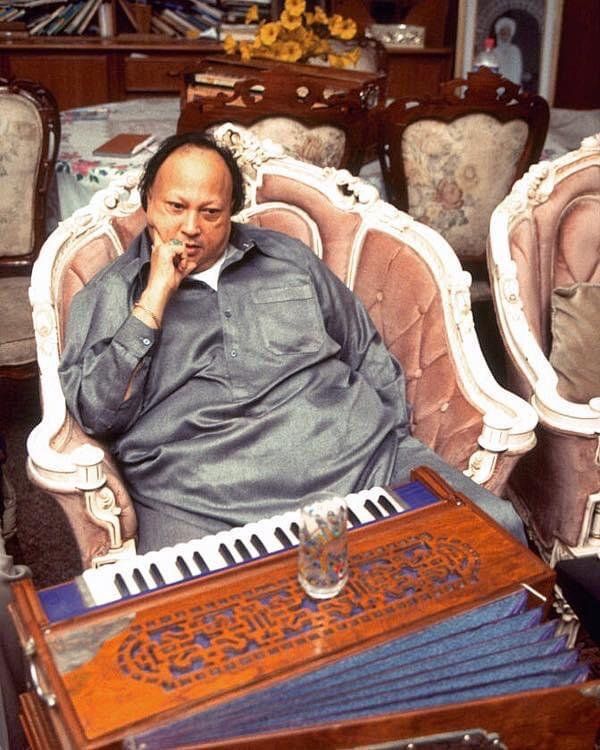
Mian Asad narrates an incident about Nusrat Fateh Ali Khan’s understanding of music and beat that ‘Nusrat was performing in a very large private gathering where he was also present and people were mesmerized. Audiences were showering currency notes on him (a common practice of showing appreciation) when suddenly he singled to a member of his Qawwal party with an eye gesture that something was wrong with his harmonium. Upon checking, it was revealed that a currency note was stuck in the outer compartment of his harmonium. Such was the command and grasp of Ustad Nusrat over his craft.
“Do you know who they are?”
Mian Asad praises Nusrat Fateh Ali Khan and says that he was a devout man, a very sincere and dignified human. According to Mian Asad, “Nusrat Fateh Ali Khan was fond of gatherings, sitting among friends and loved discussing music.”
“Nusrat used to come to the shop (Rehmat Gramophone House) two or three hours before the recording and would chat with my elder brother Mian Arshad and father,” he says. Mian Asad says that he was a dead honest and a caring soul.”As my father gave him a break through his recording studio, he always called my father his benefactor and gave him the status of elder brother, even though there was a big age difference between the two,” says Mian Asad.
Mian Asad says that “Nusrat became so famous during this period, that the Rehmat Gramophone Company too experienced a lot of success and became renowned.”
“When Nusrat was at the height of his fame in the 1990s, my father and elder brother visited him in Lahore,” he said.
“A foreign delegation was meeting him at the time, hence his staff asked my father and brother to sit in the waiting room. They both waited for about an hour. When Nusrat got to know about their arrival, he immediately got up from the meeting and came out barefooted and immediately took my father and elder brother inside and said to his staff, “Do you know who they are?”
The one sitting on the ground is not greedy for money
Mian Asad says that Nusrat Fateh Ali Khan was not greedy for money like many other artists. “Even in his prime, if my dad asked him to do a program somewhere, he never asked or inquired about money,” he said. Rather, he performed wholeheartedly. ‘
Iliyas Hussain also confirms that “whoever came sincerely and asked Nusrat for a Qawwali program, he accepted the request without asking for money.”
According to him, if an admirer from lower-middle class invited him, he “used to urge his secretary and us not to ask him for money and not to make any argument over monetary compensation.”
Iliyas Hussain says, “My teacher was a man with a huge heart. I didn’t even know how great a man he was when I lived with him.” If he were made to sit on the ground, he would sit.
Fundraising for Shaukat Khanum Hospital
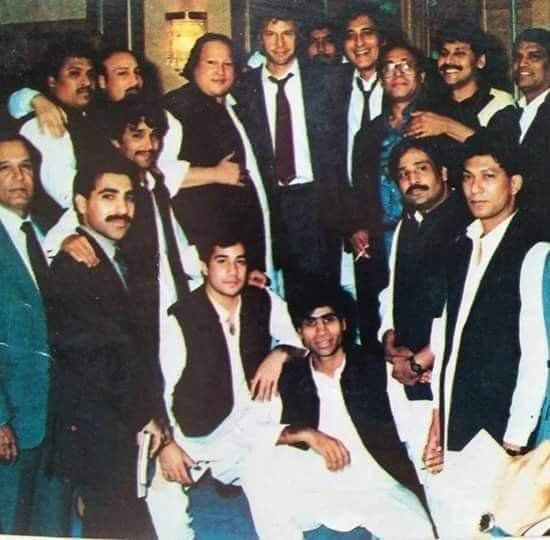
Elias Hussain says that when Imran Khan announced the construction of Shaukat Khanum Hospital after the 1992 World Cup, he did several shows in Europe and the United States with Nusrat to raise money for the work. Ilyas Hussain says, “My mentor helped Imran Khan a lot in the hospital and did several shows for him absolutely free.”
Imran Khan is also one of the big fans of Nusrat. In one of the footage, it can be seen that he is making a special request to Nusrat for a qawwali in a private function.
Relationship with his team of musicians

Nusrat Fateh Ali Khan’s good manners were not limited to his fans and other personalities but he also treated his team very well.
According to Mian Asad, whenever Nusrat Fateh Ali Khan had to go for a Qawwali ceremony or recording, he would come to the shop two or three hours before the scheduled time, while his Qawwal party members would make him wait. He would have been upset but I never saw him say anything.
While Ilyas Hussain says that ‘Ustad Sahib used to scold only during rehearsals at home, he used to tell the members of his qawwal party that its fine to make a mistake at home while practicing but not in front of people. He never scolded anyone over any petty mistake during a show or during recording.
Mian Asad says that most of the time after recording, he used to gossip and joke with his comrades and point to one of them to make fun of the other, but his sense of humor was very gentle and polite.
Iliyas Hussain also confirmed this, saying, “Yes, he loved joking with his friends, but his sense of humor never involved any derogatory or immoral remark.”
The journey from ‘Singing Buddha’ to ‘Mr. Allah Ho’
Nusrat Fateh Ali Khan freed music from the shackles of color, race, religion and language and set it on fire. Everywhere in Asia, Europe and America, he came to be called the uncrowned king of music and the emperor of melody.
Iliyas Hussain says that the spiritual effect of the Sufi word on Nusrat Fateh Ali Khan would have been such that he would go into a state of ecstasy and he would have teary eyes during the praise of Allah Almighty.
Elias Hussein says that “when he sang ‘Allah ho Allah ho’ on a tour of Europe, westerners did not understand, but they kept dancing like crazy. People in France called him Mr. Allah ho.”
In Japan, when he performed at a music festival in Fukuoka, the Japanese people labeled him “Singing Buddha” for his soothing and melodious singing.
Iliyas Hussain explains: “Whenever he went to Japan for a show, as soon as he entered the hall, everyone would get up from their seats and there would be at least a minute’s silence in his honor before the show started”.
Ataullah Issa Khailvi’s and whirling of Westerners

There is hardly anyone who did not cherish the magic of Nusrat Fateh Ali Khan’s voice.
Mian Asad narrates one such incident that ‘at the wedding of his elder brother where famous singers, musicians and artists from all over the country were present, an atmosphere was created where Nusrat Fateh Ali Khan was singing’ and Ataullah Issa Khailvi was dancing in full bloom.
While Iliyas Hussain narrates the story of Nusrat’s famous song ‘Mera Piya Ghar Aaya’ during a live show in the United States in the 90’s, he says that ‘when Khan Sahib started singing that song, the Westerners in front of the stage erupted in joy. One of the women was whirling in such a way that her feet started to bleed.
Rare recording of fifty hours
Asad, the son of Rehmat Gramophone owner Mian Rehmat, claims that even today he has a rare 50-hour recording of Nusrat Fateh Ali Khan’s songs that never came on the market.He says everything has been shut down since the death of his father and older brother Mian Arshad, and the Rehmat Gramophone Company too has shut their business operations after Nusrat’s demise.
When Ilyas Hussain was asked about the nature of his work, if Nusrat Fateh Ali Khan ever forgot a word during the show or recording, he said, “I never saw him do that from 83 to 97. His memory was very good and he practiced rigorously.

“During a show in the United States in the early 90’s, I misinterpreted a few words, but he remembered them, so he lengthened the melody, and till the time I didn’t convey the correct wordings,” he said. He did not jump to the next verses. “I’ve never seen a man with such a level of skill, he was in a league of his own,” he says.
‘Mast Qalandar’ and ‘Haq Ali Ali’
According to Ilyas Hussain, Nusrat Fateh Ali Khan loved singing ‘Mast Qalandar’, ‘Allah Ho’ and ‘Haq Ali Ali’ so much that he would cry unintentionally while performing these tracks, “My mentor was like a saint,” he recalls.
Iliyas Hussain says that despite Nusrat’s popularity, he did not forget other artists. He says that Ustad Nusrat Fateh Ali Khan helped the country’s famous solo ghazal singer Ejaz Qaiser from Faisalabad by giving his own melodies, and compositions to him so that he gets recognition. According to Ilyas Hussain, he used to get his songs recorded and would send the albums to promoters abroad so that he too could have the opportunity to perform overseas.
Establishment of Sargam Studio
Ustad Nusrat set up his own recording studio in Lahore in the early 90’s and started doing many recordings again. He had moved to Lahore from Faisalabad.
The movie Kachay Dhagay’, a tour of India and then the last tour
According to Ilyas Hussain, when Nusrat arrived in India for the Indian film ‘Kachay Dhagay’, there was a long line of fans and Bollywood artists in the hotel lobby. “The hotel lobby was full, and fans as well as actresses like Hema Malini came to see him,” he said.
Ilyas Hussain recalls Nusrat’s last visit to England during which he died. Nusrat said, “I will meet you people after I come back from UK, now I am not feeling well these days, I will come back and then we will head to the USA for a show. Afterwards we will only play in Pakistan and India.
But he probably did not know that even after his departure, the whole world would continue to be amused by his magical voice.
Show delayed due to daughter’s crying
Ustad Nusrat Fateh Ali Khan’s only child is his daughter Nida Nusrat, who now resides in Canada.
Talking about her father’s memories, Nida Nusrat said, “I was thirteen or fourteen years old when he passed away. I did not spend much time with him but my memories when I was six or seven years old are the only treasure of my life. She said that she is very proud to be called the daughter of a legendary artist.
“There is hardly an artist and a father like him. It is my privilege to be the daughter of an artist who excelled on the world stage.
“A lot of people ask me why I came on the scene after so long, people don’t know about me, so I say my father was not an ordinary person,” she says. I am living in the misery of August 16 (the day Nusrat died), I have not been able to get out of it till today.
Referring to the memories of the time she shared with Ustad Nusrat, she says, “He loved his job, he didn’t have much time, but whenever he was practicing at home, I used to secretly listen and watch him from behind the curtain of his room.
“There was a part of our house where children and women were not allowed to go. He knew I was hiding behind a curtain. If he saw me, I used to run away,” she said.
Mentioning his love as a father, Nida Nusrat recalls, “As a child, I was very fond of pens and color pencils, so he would bring me many expensive and different pens and color pencils from anywhere in the world he would go. He would bring lots of coloring boxes, half of his shopping would be for me.
“He couldn’t give much time to his family because of his busy schedule and I was very aware of that,” she recalls.
“Once when he came back home from abroad after the show, he took me in his arms and said, ‘I will spend time with my daughter.’ I asked him, Dad, how long will you stay with me?’ He started sobbing. According to Nida Nusrat, Nusrat was very sensitive in nature.
Nida Nusrat said that when we were together, he would forget the world around him, he would pay all the attention to me. “Maybe he knew he was going to leave the world very early. He was always in a hurry to do stuff. When my mother asked him why he was in such a hurry all the time, he would say, ‘I won’t be able to make you understand’.
Ndda Nusrat says, “Whenever I had the opportunity to go with him to a show abroad, he would make me sit right in front of the stage and his eyes would light up when he would look at me during the show.” Even during the break, he would call me on the stage and ask if I wanted anything.
About a childhood incident, Nida Nusrat said, “I was about six years old at the time and I was with him for a show in London. I forgot my toy because we left home early and when we arrived there, I started crying, which made him very upset.
“He couldn’t see me upset. On the other hand, the show organizers were telling him to start the show because it was getting late. He said, ‘I can’t start the show until my daughter is quiet.”
“So a servant was sent back home and my toys were brought to me and when I stopped crying and felt more at peace, he started the show late.
She says that whenever any of her albums were released, he would give me the first copy and release it in the market the next day. I would sleep by keeping the cassettes of his albums under my pillow.
Asked if Nusrat ever asked her to sing, Nida said, “It is a tradition in our family that women do not sing, but sometimes when he was at home and during practice he would call me and ask me to sing with him.
“I’ve never sung professionally, but I still sing at home events,” she says.
Nusrat’s daughter said, “As a child, I used to get upset over little things and he would often tell me, ‘you are not my daughter, you are my son. Never be afraid of anything and always face things bravely.’
“My mother and I have been in sorrow till date and will always regret not going with him on his last visit tour to London.”




